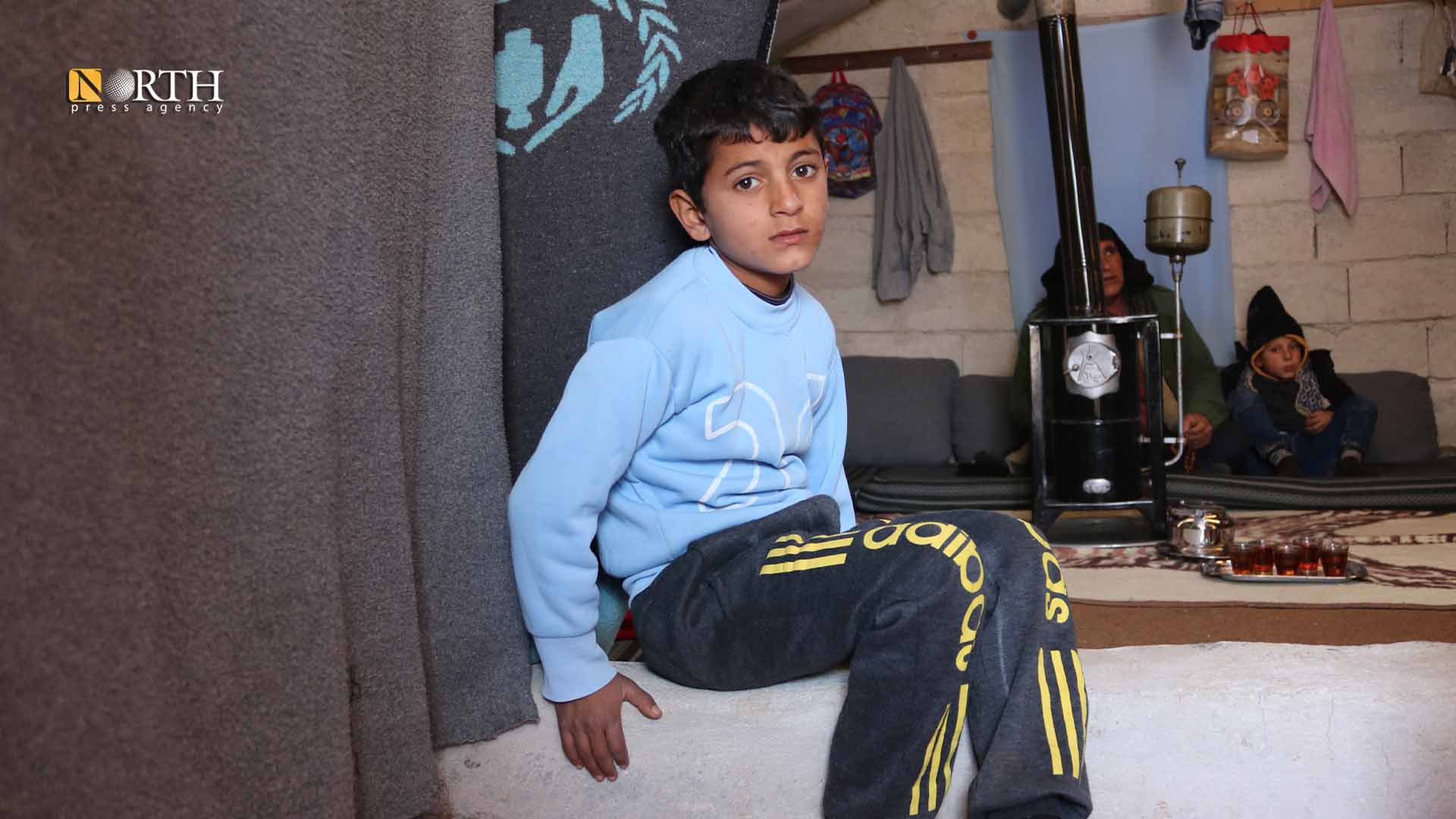ALEPPO NORTHERN COUNTRYSIDE, Syria (North Press) – The 11-year-old Sobhi Khalil, who suffers from hearing loss, is used to sit in front of the TV watching a series trying to understand the events through actors’ motions and facial gestures.
Khalil was born with hearing and speech defects and he primarily communicates with his family using gestures and signs.
Sha’ban Khalil, the father, said they discovered Sobhi’s disability when he was six months, “He did not respond or react to the sounds around him”.
The family took Sobhi to doctors in the region, but “We did not gain benefit,” the father, who works in an institution of the Autonomous Administration of Afrin currently operating in the northern countryside of Aleppo, said.
As a result of being displaced several times and resorting to camps that lack the least services for helping those with disabilities, the sufferings of Sobhi, who spends most of his time isolated from his peers, have increased.
In 2013, Khalil’s family fled their village fearing the Islamic State Organization (ISIS) terror that had run areas of the northern countryside of Aleppo at the time and it resorted to Kafr Janneh village in Afrin region, north Syria, where they stayed for two years.
Then, the Autonomous Administration of Afrin established a camp in a village, in the southern countryside of Afrin, for those arriving in the region, so that the family moved to the camp.
In January 2018, the camp was hit by shells due to the Turkish aggression on Afrin with the support of the Turkish-backed armed factions, and again the family was forced to flee to the northern countryside of Aleppo and reside in Barkhodan Camp.
“We cannot treat our child”
The Turkish military aggression in 2018, caused the displacement of about 300,000 people from Afrin to live in the camps of al-Awda, Afrin, Barkhodan, Sardam and Shahba, while others were distributed among 42 villages and towns in the northern countryside of Aleppo, while a number of families were displaced to Autonomous Administration areas or migrated abroad.
According to a previous statistic by the Social Affairs and Labor Board of Afrin (currently operating in the northern countryside of Aleppo), 2,000 IDP families from Afrin are distributed in the five camps, and about 140,000 people live in deserted villages and towns.
Other families preferred to live in other Syrian cities and towns, especially those controlled by the Autonomous Administration of North and East Syria (AANES).
Because of the destruction of their house and for fear of being arrested by the government forces, the Khalil family, especially the father, cannot return to their village, or even visit it, even though Barkhodan camp is only eight kilometers away.
The Syrian government forces control areas in the northern countryside of Aleppo where IDPs of Afrin are residing, and points for the Russian forces are stationed.
Khalil’s family, like other displaced families in other the camps in the northern countryside of Aleppo, suffers from harsh living conditions due to the lack of job opportunities and the high prices of materials, in light of the restrictions imposed by government forces on the area.
In light of the deteriorating living conditions, Khalil’s family cannot secure the price of a hearing aid for Sobhi.
“We can’t even do audiograms or treat our child,” the father said sadly.
Last year the family sent Sobhi to the Barkhodan Camp school, “but the teachers could not deal with his special situation, so he no longer attended it,” the father noted.
Meanwhile, due to the lack of educational centers for people with special needs in the area, Khalil is kept away from school.
Patient’s needs
The family feels grieve regarding their child’s situation, “the presence of a sick person in the family affects us as a whole at a time when we can do nothing,” the father noted.
He calls on NGOs and associations concerned about IDPs’ affairs to provide assistance to conduct the necessary checkups and treatment for his child.
The Kurdish Red Crescent Organization operating in Afrin and other areas of the Autonomous Administration is unable to provide medicines and treatments for about 2,500 patients suffering from chronic diseases, according to the organization’s co-chair, Hassan Nebo.
In a previous statement to North Press, Nebo said the lack of support provided to the organization, the government siege, and the failure of international medical organizations to provide aid, increase the suffering of patients and exacerbates their health situation.
The three-year-old, Zakiya Hajiko, suffers from a Sensorineural hearing loss in both ears, in addition to the disability to speak.
According to recent medical reports and audiograms, she hears only 10%, so that she cannot communicate with her surroundings normally.
The girl child is currently living with her parents and sister in Barkhodan Camp, after they were displaced from their village of Qibar in Afrin city.
Nazliya Ali, the girl’s mother, said: “the doctors stressed that any delay in securing the hearing aid for the girl will not be in her best interest”.
“But we are witnessing very difficult living conditions in light of the lack of job opportunities and the prices hike, so that we can’t buy hearing aids.”

